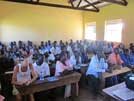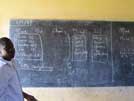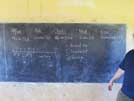

Click on a photo to see a bigger one
By Philippe Lamoise
  
|
I explained that the newly generated income, could be used in 3 ways: investment to grow their business, savings to have some safety if anything goes wrong one year, and personal use to improve their living conditions. We explained the concept of investment was only working if the increase in revenue is higher than the amount you spent on the investment. That a real simple concept for us in the United States, but it is not obvious for them in the local community, since they would very often start something without any planning or calculations of how much they would get as revenue, compared to how much they spent. So after my section of the training, chuck continued in the same direction and explained the basics of enterprise budgets.
 
|
So the afternoon training session was spent to explain the basics of microcredit. The community would have to get organized in groups of 5 people (reinforcing the group enterprise training of Tuesday) to apply for some small loans with a repayment guarantee from the other people in the group. After the first loan is paid back successfully, the people in the group would be able to go through another loan cycle with higher loan amounts. Many of these farmers do not have any colateral to guarantee a loan when they apply for it at a commercial bank, so this microcredit concept gives them access to small amounts of money, while allowing them to build a reliable "credit history" so that they would not be turned down later when applying for a loan at a commercial bank.
 A lot of these microcredit projects are happening throughout the world, and are very successful loaning to women only. But the Kampala North Rotary Club, and the local community decided that we would do this project with both men and women. We wrote on the blackboard the reasons women were more reliable. I told them that we were taking a risk by including the men, so the men would have to make sure they are honest, hard-working, committed, etc.
A lot of these microcredit projects are happening throughout the world, and are very successful loaning to women only. But the Kampala North Rotary Club, and the local community decided that we would do this project with both men and women. We wrote on the blackboard the reasons women were more reliable. I told them that we were taking a risk by including the men, so the men would have to make sure they are honest, hard-working, committed, etc.
Home |
Calendar |
Directory |
Club Information |
Club News |
Yellow Pages |
Speakers Bureau |
Registration |
Quickbits
Newsletter |
Public Relations |
Membership Resources |
Club Service |
Community Service |
Vocational Service
New Generations |
International Service |
Rotary Foundation |
Peace |
Training |
Awards |
Rotary Links |
Archives
